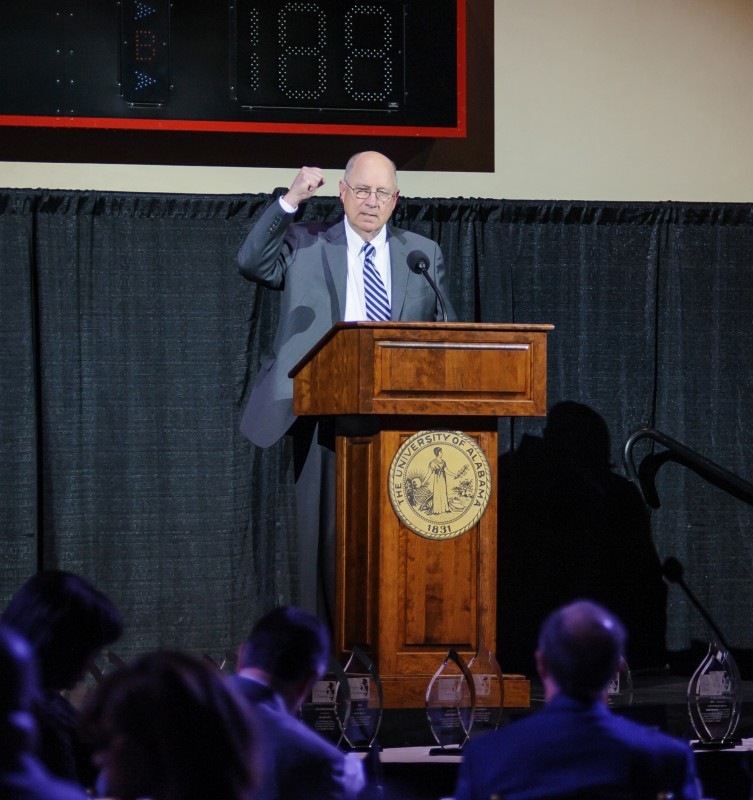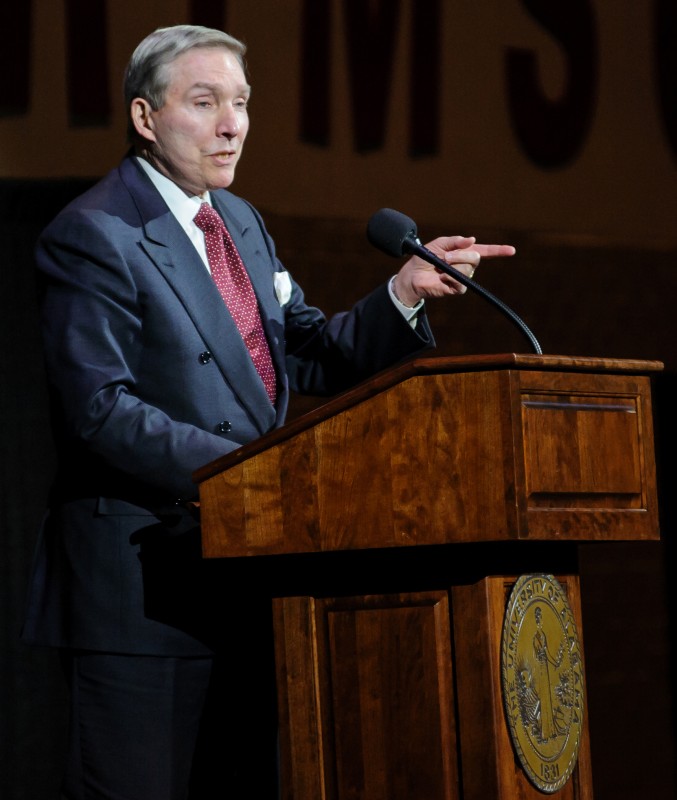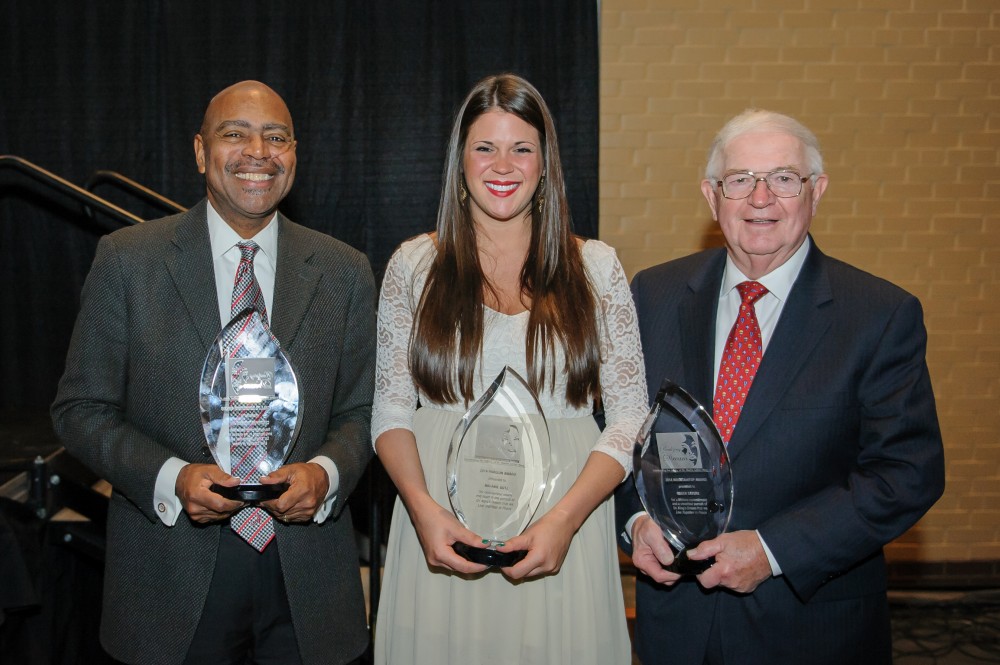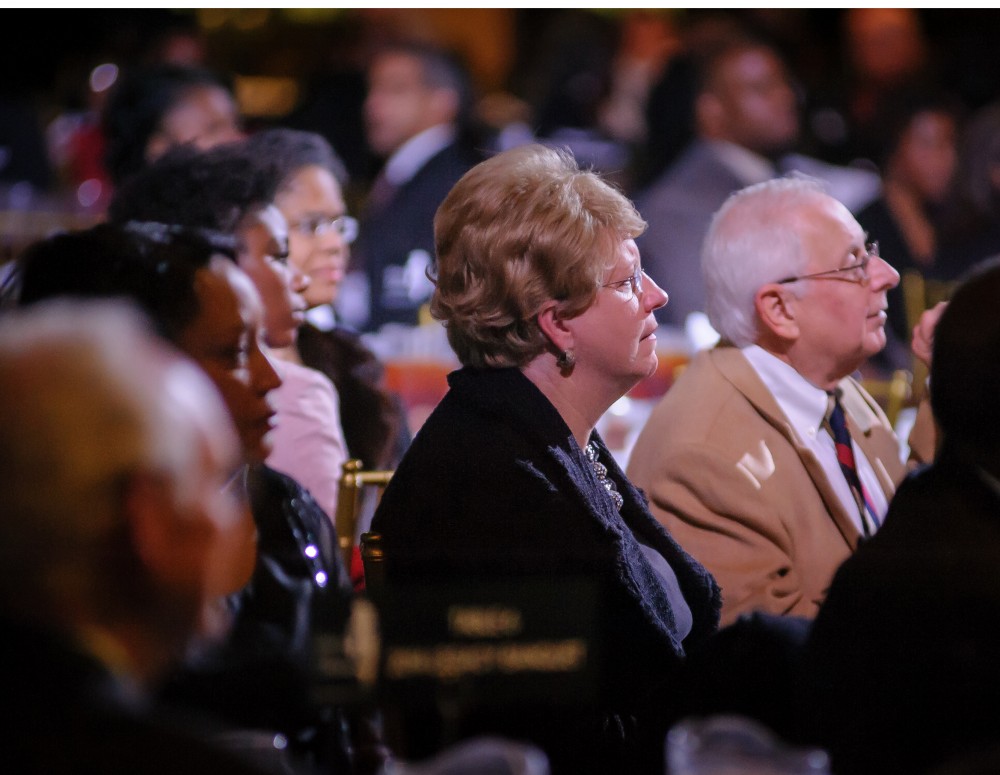By Kirsten J. Barnes
CCBP Graduate Assistant
[ Complete text of Cochran’s speech ]
[ Video of Banquet ]

Three-time Emmy Award-winner John Cochran, a premier network correspondent for almost 50 years, knows first-hand the impact the Rev. Martin Luther King Jr. had on the state of Alabama and, most notably, his hometown of Montgomery.
“I was lucky enough to have been born in Montgomery before the civil rights struggle really broke out,” Cochran, who’ll be 75 on March 15, told 300 people in historic Foster Auditorium attending the 25th Annual Realizing the Dream Legacy Banquet.
Cochran captivated the audience with his firsthand, culturally sensitive story about his family’s African-American maid named Arrie, who worked for them during the mid-1950s, simultaneously weaving in information about Rosa Parks and the Montgomery Bus Boycott.
“I’ve been around presidents and prime ministers and captains of industry, but I have never known anyone with more dignity than Arrie,” said Cochran, recalling Arrie as a mid-50s, well-spoken, well-dressed, intelligent woman.
Cochran reminded the audience that although the U.S. Supreme Court had already outlawed segregation on interstate travel, Alabama state and municipal buses were still segregated.
“(Rosa Parks) and others in the Civil Rights Movement had wanted a test case in the courts to challenge the state law requiring segregated seating,” Cochran said. “Black leaders wanted not only a test case; they also wanted to test the resolve of white merchants by putting economic pressure on the white establishment.”

On Dec. 1, 1955, the day Parks refused to give up her seat to a white rider, the bus boycott began. However, many do not understand how it affected blacks and whites in Montgomery.
When blacks stopped using buses, they could not get to white-owned merchants to buy things and many domestic workers could not get to or from work.
Until the boycott, Arrie used city buses for transportation to and from work. Arrie told the Cochrans she planned to do whatever Dr. King told her to do and that meant participating in the boycott. Though she had found a ride to work, she had no way home. It was up to the Cochrans to find a solution, which turned out to be, as Cochran said, “Me. I had just gotten my driver’s license. So, every day after I got out of school it became my job to driver Arrie home.”
For the first few weeks Cochran sat behind the wheel while Arrie sat in back. He said it was the reverse of the Academy Award winning-movie “Driving Miss Daisy.” This time the black person was in the back and the white person in the front.
“That’s the way it was supposed to be in the South. Blacks and whites were never supposed to sit together. It was a rule — not a law — … an unspoken rule, but a rule nevertheless,” Cochran said. “That went on for a few weeks until one day Arrie and I were walking out to the car and Arrie stopped, turned to me and said, ‘Johnny, I’m going to sit up front with you…’.”
As they sat beside each other each day they drove through his neighborhood, a white neighborhood, and then through her neighborhood, a black neighborhood. Immediately, both whites and blacks alike stopped to stare at them as they passed.

“This went on for a couple of months,” Cochran said. “Then one day Arrie and I noticed no one was paying attention anymore. People had grown accustomed to seeing us. The rule was no longer a rule.”
On June 13, 1956 the U.S. Court for the Middle District of Alabama ruled segregation was unconstitutional under the Fourteenth Amendment, which guarantees protections for equal treatment.
However, the state and city appealed this ruling, and on Dec. 17, 1956 the U.S. Supreme Court upheld the lower court’s decision in Browder v. Gayle; and three days later the court demanded Alabama desegregate its buses.
“It was a total victory for Dr. King, but it did not come easily,” Cochran said. “Many blacks — literally — wore out their shoes walking either to work or to school, houses were bombed, Dr. King and others were put in jail, some blacks lost their jobs because white employers were vengeful, and some, like Arie, thought they might lose their jobs, but went ahead anyway.”

Later, Cochran described his sister’s failed efforts to integrate First Baptist Church in Montgomery with the Rev. David Abernathy, after hearing King speak. “No history was made that day, but I was proud of her for trying,” Cochran said of his sister, Mary Ann.
He then moved to the failed efforts to integrate UA by Autherine Lucy in 1956 and the failed efforts of then Gov. George Wallace, who attempted to keep Vivian Malone and James Hood from registering for classes at Foster, the very building the event was being held in.
“I crossed paths with Wallace several times over the years,” Cochran said, recalling the transformation of Wallace from a segregationist to a more caring person who worked to make amends for his transgressions.
Several attendees commented how apropos Cochran’s speech was. And Dr. Samory Pruitt, vice president of community affairs, said, “As I look around this room I see people who have been here almost every year we’ve done this,” said Dr. Samory Pruitt, vice president of Community Affairs. “We were honored to have had as the keynote speaker, Mr. John Cochran. His speech was riveting and remarkable.”
Dr. Ed Mullins, former dean of the UA College of Communication and Information Sciences and now a director within Community Affairs, introduced Cochran after another former dean of that same college, Dr. E. Culpepper (Cully) Clark, set the historical stage for Cochran’s remarks. Clark is the author of the definitive book on the integration of the University, The Schoolhouse Door: Segregation’s Last Stand at the University of Alabama.
This was the 25th anniversary of the Legacy Banquet. It began in 1990, hosted then as now by Stillman College, Shelton State Community College, the Southern Christian Leadership Conference, and The University of Alabama.
Pruitt shared the following message he sent to Cochran in an email after the banquet:
“Thank you for agreeing to serve as the speaker for the Legacy Banquet commemorating the 25thAnniversary of the formation of the Realizing the Dream Committee, and for providing us with the text of your speech. As I mentioned to you and Barbara (Cochran’s wife) on last Friday, you were our first and only choice as speaker. We continue to receive emails and comments about the remarkable and historic speech you gave during the banquet. Again, thanks.”
Earlier, Wendel Hudson, former UA women’s basketball coach, the first African American to receive an athletic scholarship, told of his experience as a pioneer of integration.
After Cochran’s speech, videos were shown and the 2014 Legacy Banquet honorees were recognized as follows:
• Melanie Gotz, Horizon Award, for her leadership in the fight to open traditionally white social fraternity organizations to all races.
• Cleophus Thomas, Call to Conscience Award, for his community and public leadership in race relations.
• Dr. Roger Sayers, Mountaintop Award, for the roles he played as a UA executive, including president, to open opportunities on campus to all races.